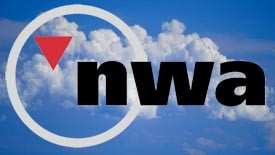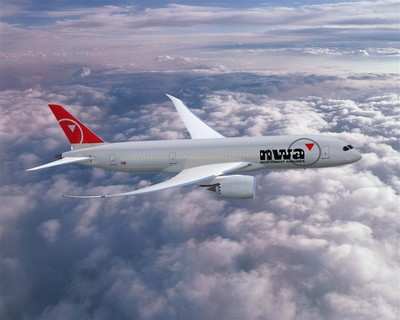ALPA Cites Morale, Stress Problems; Urges Pilots To "Fly the
Contract"
 Northwest Airlines is
currently the nation's number five airline... but if its recent
surge in flight cancellations doesn't even out soon, that position
could be in jeopardy.
Northwest Airlines is
currently the nation's number five airline... but if its recent
surge in flight cancellations doesn't even out soon, that position
could be in jeopardy.
Flight cancellations at NWA far exceed those of other major US
airlines, according to CNNMoney. Just Monday, the carrier cancelled
173 flights -- that's about 12 percent of its total 1,148 scheduled
flights for that day.
That compares to an average of only 2.1 percent of overall
cancellations at the other major airlines, including American
Airlines, United Airlines, Delta Air Lines, Continental Airlines,
US Airways, Southwest Airlines, and JetBlue.
NWA was second only to American Airlines, which cancelled "only"
5.6 percent of its flights. Sadly, Northwest's cancellations
exceeded the amount of cancellations by six major airlines
combined, which totaled 134.
As of 1445 EDT Tuesday, the carrier had cancelled 143 flights,
or more than 10 percent of its scheduled flights. CNNMoney obtained
the stats from the flight tracking service FlightStats.
The Air Line Pilots Association says the problem is due to
management changing work rules that push pilots past reasonable
limits and delays that eat into FAA-mandated allowed flight hours
-- thus causing a pilot shortage.

The carrier, on the other hand, blames the weather. Northwest
issued a statement saying recent bad weather on the East Coast and
Midwest disrupted the schedule and was the primary reason pilots
were without allowed flight hours needed to staff all its flights.
Plans are in the works to fix the problem, like making sure flights
are cancelled far enough in advance to facilitate appropriate
rebooking.
"How could it not be bad planning? If it was weather you'd see
it across the board at other airlines," said Wade Blaufuss, a
spokesman for the ALPA and NWA 757 first officer. "We have a
fatigue problem, a morale problem and a stress problem."
Blaufuss said the current work environment has discouraged its
385 furloughed pilots from coming back to work. He said most of
those that have been called back have declined.
The ALPA is telling its members to follow their contract to the
letter. "Fly safe. Fly the contract. Don't fly sick. Don't fly
fatigued. Don't fly hungry," the union's hotline message said
recently.
Blaufuss denies a work-to-rule campaign is part of the problem,
saying the problem lies with current company rules that don't allow
for normal disruptions or problems.
 "It all looks great on
paper 'Let's schedule to the max possible with no slack in the
system,'" said Blaufuss. "But it's an airline, with a lot of moving
parts. We're not manufacturing widgets. All these things have to
work in synch."
"It all looks great on
paper 'Let's schedule to the max possible with no slack in the
system,'" said Blaufuss. "But it's an airline, with a lot of moving
parts. We're not manufacturing widgets. All these things have to
work in synch."
At its June 15 meeting, ALPA members passed a no-confidence
resolution stating "all indications are that staffing is below what
is required to properly fly the summer schedule and this staffing
shortage will have a noticeable and costly impact on NWA's summer
flying, revenue and passenger goodwill."
The carrier has had more than its fair share of labor problems.
Its pilots were the last major airline pilots group to go on strike
in 1998; the Aircraft Mechanics Fraternal Association went on
strike in August 2005, and the union has repeatedly protested and
criticized the carrier on money issues.
NWA emerged from bankruptcy May 31 and this is the first time in
five years that no major U.S. carrier was in some form of
bankruptcy proceeding.
 Aero-News: Quote of the Day (04.28.25)
Aero-News: Quote of the Day (04.28.25) ANN's Daily Aero-Term (04.28.25): Decision Altitude (DA)
ANN's Daily Aero-Term (04.28.25): Decision Altitude (DA) ANN's Daily Aero-Linx (04.28.25)
ANN's Daily Aero-Linx (04.28.25) Airborne-Flight Training 04.24.25: GA Refocused, Seminole/Epic, WestJet v TFWP
Airborne-Flight Training 04.24.25: GA Refocused, Seminole/Epic, WestJet v TFWP Aero-News: Quote of the Day (04.29.25)
Aero-News: Quote of the Day (04.29.25)





